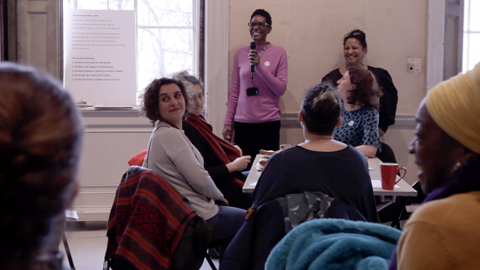Amanda Parker Writes for The Guardian on Board Diversity
25 February 2020 | By Amanda Parker
Leadership skills come in black too – even if most 'inclusive' boards can't see it
People like me too often get put on a board because we’re a colourful addition to the meeting, rather than for our acumen
I was first approached to join a management board when I was on maternity leave. I said yes, unaware that I would be joining as chair and that the role would give me ultimate responsibility for a £1.5m budget – and the health, education and life outcomes of tens of thousands of children under five in my area of London.
If I’d thought through the implications, I’d probably have said no and missed out on a fantastic opportunity to develop my personal leadership.
But what I also didn’t realise in those first months was that my appointment might have had more to do with the organisation trying to signal it was being inclusive and representing the local, working-class, black and minority ethnic community, rather than an appreciation of my skills.
So it was a shock when older board members with more experience than me, and staff from partner organisations like the NHS and the local authority, tried to railroad me into decisions that they had made irrespective of my contribution.
However, because I’m opinionated, inquisitive and like to be on top of detail, that didn’t last. I soon found my confidence and learned quickly, with the support of a fantastic management team.
Looking back, I’m grateful that my first board experience, though a steep learning curve at the time, was with an important body with a national profile. It helped me develop some effective management strategies for dealing with noisy, angry men. I still use some of them when necessary (though not, alas, the “surprise need to breastfeed my baby”).
What I have learned is that a culture change is needed on all UK boards, not just a change of the skin colour of those around the table. Personally, I don’t care if you hire me because of my skin colour. The mistake will be yours if you don’t realise that opinion, knowledge, expertise and leadership also comes in black. I have confidence in my own skills and know I can make a contribution, because I have professional expertise developed and tested over years. Countless studies show diverse boards make better, more inclusive decisions that have been shaped and considered by people with different experiences.
But still, I’ve too often been interviewed for a board position or sat in board meetings where I can tell I’m meant to be a colourful addition, rather than making a genuine contribution.
At the end of one interview, for instance, for a highly regarded arts organisation, after I had outlined a digital strategy for the organisation’s wider public arts engagement, the response from the chief executive was: “I like your jewellery.” So here’s a clue: if someone comments on my hair or jewellery during an interview or board meeting, I can tell that they are not listening to what I am saying.
I totally applaud and endorse all efforts to diversify boards. I deliberately diversify every space I’m in if I have any influence at all, and I actively seek to bring in people from different backgrounds because getting different perspectives is important.
But here’s the difference: when I diversify a leadership team, I always look for evidence of appropriate and effective skills from each prospective candidate. If those skills are underdeveloped, then, just as I benefited during my own first experience on a board, I will, in turn, support other people to develop their skills. An effective board needs different perspectives. You can grow skills and develop different perspectives – but you can’t do either if there’s no one to learn from.
And more important than hiring people with different perspectives is keeping them. If organisations hire simply for skin colour, that will fail. The answer lies in good practice: have a good induction process; have a buddy system to enable new board members to have a supportive person to answer their questions while they’re learning; have a glossary of any special terms in the sector; and ensure there’s regular training. Be inclusive in how things are done: try out different times and different days for meetings and events, as well as different ways of delivering information. All these help people feel they belong.
But more than this, people need to know the benefits of being on a board, and how it can help them develop. That’s what I always start with when I encourage people to get involved. I also find it funny when organisations wonder how to find prospective board members. It’s not rocket science: find people who aren’t like you. Broaden your perspective. Listen to new things; go to new places; enter digital spaces where there are people who aren’t like you – and be humble.
Amanda Parker is a director of Inc Arts and a consultant with Arts Fundraising and Philanthropy.
Read the original article on The Guardian here.


